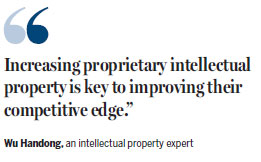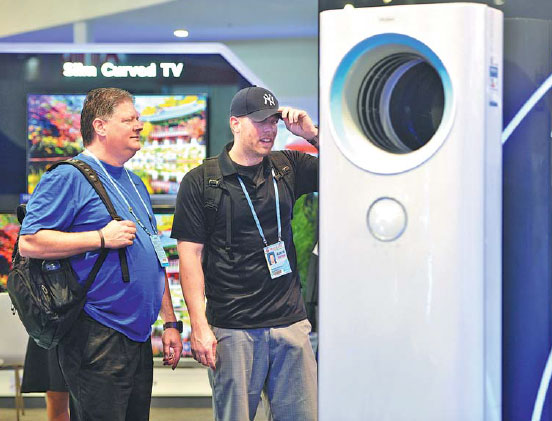Entrepreneurs urged to heed intl IP rules
Rapid globalization makes adherence to such norms crucial, says top expert
Entrepreneurs should ensure they are primed to keep up with the pace of global expansion, in which intellectual property rules have been deeply embedded, said Wu Handong, a renowned IP expert.
Wu, former president of Zhongnan University of Economics and Law in Hubei province, who was named one of the world's 50 most influential figures in the IP sphere in 2009 and 2011 by the British magazine Managing Intellectual Property, made the comments in an interview with China Daily prior to his attendance at the ongoing Boao Forum for Asia being held in Hainan province.
Wu will deliver a keynote speech at an IP session during the forum on Friday. The forum opened on Thursday and will last through Sunday.
"IP rules are a standard part of international trade," Wu said. "They ensure a healthy global business environment."

Thus Chinese companies involved in foreign trade need to learn the rules when it comes to IP. They include the Agreement on Trade-Related Aspects of Intellectual Property Rights, which is an international legal agreement between all members of the World Trade Organization, signed in 1994, as well as an array of bilateral and multilateral trade agreements covering IP protection, he said.
Wu also noted the importance of conducting research into unilateral IP sanctions imposed by the United States, including via Section 301 of the US Trade Act of 1974, which allows it to impose trade sanctions on foreign countries that either violate trade agreements or engage in other unfair trade practices, as well as Section 337 investigations into companies' suspected violations and the "notorious market" list aimed at both online and brick and mortar marketplaces.
Data from the General Administration of Customs show that China reported a 0.9 percent year-on-year drop to 24.33 trillion yuan ($3.53 trillion) in foreign trade last year.
Foreign exchange fluctuations and price falls in international bulk cargo markets contributed to the reduction in trade, Gao Hucheng, then minister of commerce, said at a news conference in February.
Xing Houyuan, deputy director of the China Service Outsourcing Research Center affiliated with the ministry, told the Beijing-based Economic Information Daily that as China advances supply-side structural reforms, the industrial restructuring is being reflected in foreign trade.
Wu said the Belt and Road Initiative, a strategy proposed by President Xi Jinping in 2013 to increase international cooperation via the Silk Road Economic Belt and the 21st Century Maritime Silk Road, has provided more opportunities for higher-level opening-up and continues to facilitate trade and investment.
The IP veteran called on Chinese companies to develop a global strategy and mindset as well as legal awareness as they look to compete on the international stage. He encouraged those companies going abroad to shift their focus from their competitors' prices to patented technologies and well-established brands.
"Increasing proprietary intellectual property is key to improving their competitive edge," Wu said, adding that winning domestic patents will not, by itself, help Chinese companies to expand abroad.
Improving technologies, promoting participation in formulating international industrial standards and fostering business brands have all been earmarked as major tasks in a foreign trade development plan for the 2016-20 period released by the Ministry of Commerce at the end of last year.
The latest data from the World Intellectual Property Organization show that international patent applications from China filed via the Patent Cooperation Treaty numbered 43,168 in 2016, ranking the country third on the PCT chart by country, after the United States and Japan.
WIPO Director-General Francis Gurry said at a press conference in Geneva, Switzerland, on March 15: "China's performance is quite extraordinary. In terms of international patent applications, the number of applications from China rose by 44.7 percent in one year."
The country has maintained annual double-digit growth in PCT filings since 2002.
With 4,123 applications, a year-on-year surge of 91.3 percent, Chinese telecommunications giant ZTE reclaimed top spot among the world's largest 10 PCT corporate filers last year, followed by its Chinese and US rivals Huawei Technologies and Qualcomm, respectively.
The ranking shows ZTE's improvement in innovation in the sphere of information and communications technology and also reflects the fact that the company both respects and has mastered international IP rules, its Chief IP Officer, Shen Nan, told Chinese media.
Despite only ranking 34th on the list, e-commerce colossus Alibaba still managed to come second among the world's dotcom enterprises, behind Google.
wangxin@chinadaily.com.cn
|
Visitors show interest in a China-made home appliance at the China Import and Export Fair, also known as the Canton Fair, in Guangzhou, Guangdong province, in 2016. Lin Guiyan / For China Daily |
(China Daily 03/24/2017 page17)















